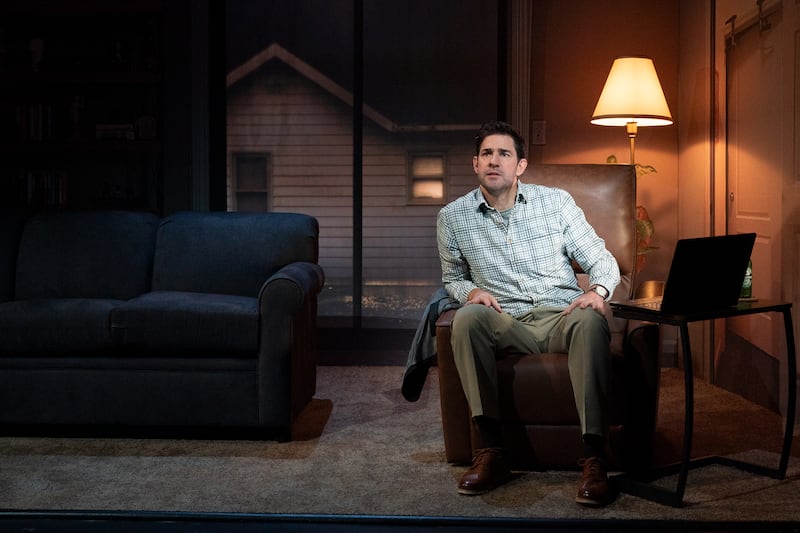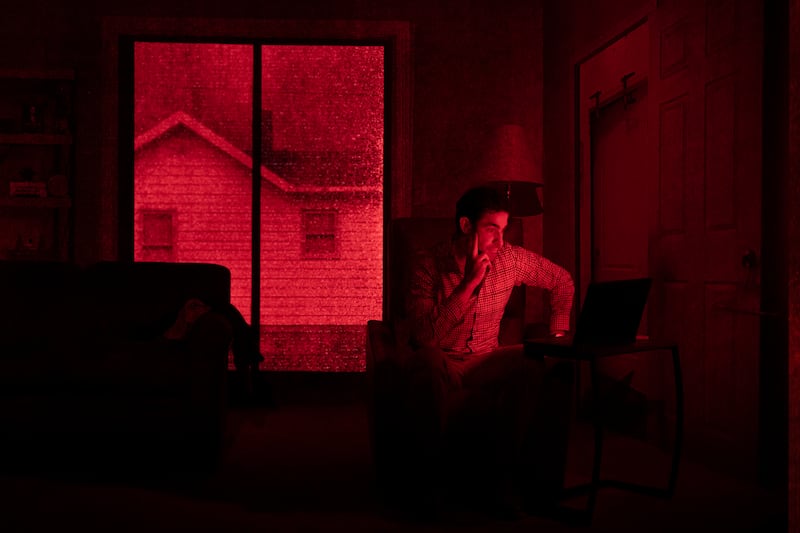The tension within Penelope Skinner’s play Angry Alan (Studio Seaview, booking to Aug. 3) is down to the well-known, puppyish, regular-guy charm of John Krasinski, and the dark forces that curdle that charm into something rancid and dark.
Like the Jean Smart-starring Call Me Izzy at Studio 54, which opens Thursday night, this is a 90-ish minute show dependent on its distinctive banner name to sell tickets. Both are monologues (strictly speaking Angry Alan is mostly a monologue, bar a late second-voice intrusion), and both seek to muddy the familiar images of John Krasinski and Jean Smart.
In Angry Alan, which was originally performed on the Edinburgh Festival Fringe in 2018 by the play’s co-creator Don Mackay, Krasinski plays a guy called Roger who first seems to be the squarer version of what Krasinski’s character Jim Halpert from The Office may have grown into: genially handsome, regular white collar job, older, divorced, dressed in flat-front chinos, sensible shirt (the astute costuming is by Qween Jean), living in the suburbs.
A simple set by design collective dots presents exactly the kind of bland living room you’d expect for this Every Guy to live in; nothing too ostentatious, the blurred outline of neighbors’ modest houses visible through a living room window. The set hides another vista, which emerges later: a dull conference room where a men’s rights conference is taking place.

The play, directed with a breezy economy by Sam Gold, traces Roger’s ultimately corrosive immersion in the world of online misogyny; a sugar-coated poison pill that, by dint of timing, makes the play feel like a softer, grown-man companion piece to the recent Netflix hit Adolescence, even if Angry Alan was written long before it and the prevalence of such figures as Andrew Tate. Sadly, it still feels timely.
The “Angry Alan” of the title is something or someone Roger comes across online; we never meet “Alan,” whoever that is.
Lucky Mackinnon’s snappy background projections and Isabella Byrd’s lighting help give the play an air of a Moth-meets-TED Talk, with chapter headings like “The Confusing Hypocrisy of Modern Women” and sudden, bloody drenchings of stage-filling red to signify “red-pilling.” Slowly Alan’s pronouncements beamed into his inbox—for example, “a lot of rapes are a result of false allegations”—begin to make more and more sense to the highly receptive sponge that is Roger.
Skinner cleverly studs the play with what initially seem to be micro-frustrations that can be easily handled. Krasinski makes Roger funny, and the way he tells it he’s just a regular guy out of whack with bits of the world around him. His brief and terse-sounding texts to his initially unseen son Joe (Ryan Colone) are written in all caps—only we, the audience, hear the real emotion and tenderness underneath them.
Gradually, Krasinski comes to embody two realities simultaneously, making clear the cracks behind Roger’s geniality even as he continues to make jokes and tell us a story. We see his perverse interpretations of a tetchy relationship with his ex-wife Suzanne, and a relationship with current girlfriend Courtney that is being complicated (in his eyes) by her embrace of feminism. He loses his job. But still, everything we see as dark is coated with Roger’s armor of casual affability.
Then Angry Alan’s online entreaties begin to take a harsher effect. Roger is seen convinced of the rise of an anti-male “gynocracy.” His self-deluded rationalizations and down-is-up misreadings of the world around him—where women are to blame for everything that goes wrong in a man’s life, and men are relentlessly persecuted and bullied—are presented as if he is enthusiastically, not angrily, embracing a refreshing new language and philosophy.

To us, especially when he attends the grievance-filled men’s right’s conference—the only two visible attendees are mannequins—it seems as if he is being swallowed by mind-warping conspiracy theories. When Alan asks him for money where the audience sees a nakedly manipulative grab for cash, Roger clicks the “donate” button, seeing a zealous new purpose and community.
At some point, you feel, the mask has to fully slip, and so it does with the arrival of Joe, delivering a twist of a revelation (that isn’t that much of a twist), followed by Roger’s ugliest, most blatant meltdown.
The ultimate message of the play is far from redemptive. That makes sense. What makes less sense is Roger’s route to his own pathetic oblivion. The play mines for laughs and shock the disconnect between Roger’s regular guy-ness and the violent misogyny he begins to imbibe, but never fully explains his all-too-ready supping of the cup.
Roger questions nothing of Angry Alan, even as he angrily questions the women around him. However, Krasinski’s beguiling performance still makes Roger’s tragically self-sabotaging embrace of the worst online poison, and how much damage it can do, all too plausible. The play’s message is as simple as Krasinski’s suburban-dad smile: This can happen to anyone.
The post John Krasinski Gets Red-Pilled by the Men’s Rights Movement in New Play appeared first on The Daily Beast.




